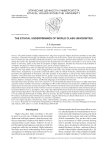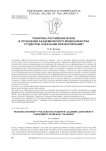Этические ценности университета. Рубрика в журнале - Университетское управление: практика и анализ

The ethical underpinnings of world class universities
Статья научная
The public benefits of higher education have long been recognized. Higher education contributes to the public consensus; it transmits knowledge and attitudes toward the role of the citizen; and it may model good behavior in the face of controversy and sometimes intellectual acrimony. Great universities, perform these functions very well. This is among the reasons why attention has been paid to the characteristics of world class universities [1-3] as well as to the threats to university quality in the form of corruption in higher education. Attention has focused on the definition of corruption, the degree to which corruption occurs, and its economic impact [4-7].This paper combines these lines of scholarship and explores the degree to which world class universities exhibit ethical qualities. The study defines ‘ethics’ in the management of a university. This includes mission statements which mention ethical issues, transparency in governance and fiscal affairs, codes of conduct for faculty, administrators and students, procedures for adjudication of infractions, and other elements. It then proposes a rating for the ethical infrastructure elements. Universities have been divided into two groups. First are universities listed on the Times Higher Education Supplement (THES) international ranking. The second are random samples of universities in countries which use English, Korean, Japanese, Georgian, Chinese, and Russian languages as the medium of instruction.The paper poses three questions. First, how common is it for internationally-ranked universities to exhibit ethical char-acteristics on their websites? The answer is unambiguous: 98 % of the world class universities have established an ethical infrastructure of some kind. Second, which areas of the world are more likely to have universities which exhibit a depth of ethical infrastructure elements on their websites? In terms of countries, the most comprehensive ethics infrastructure can be found in Britain, the U.S., and Japan. Lastly, what is the relationship between the level of international ranking and the depth of ethical ingredients? The strength of the relationship is weak, suggesting that the depth of ethnical infrastructure is not an important determinant of ranking. However given the fact that virtually all ranked THES universities, across 40 counties, mentioned ethical infrastructure elements, suggests that having an ethical infrastructure is an important ingredient associated with other elements in a university’s reputation.
Бесплатно

Статья научная
Практики нечестного поведения студентов - одна из значимых проблем высшего образования во всем мире. Поэтому руководители и администрации вузов стараются разрабатывать меры борьбы с нечестностью студентов, направленные как на наказание обучающихся, так и на формирование у них ценностей честного поведения, причем за рубежом начинают набирать популярность ценностные меры. В рамках данной исследовательской статьи используется дискурс-анализ для изучения этических документов и публичных высказываний руководителей российских вузов, участвующих в Проекте 5-100 (всего в нашу выборку включен 21 вуз). Проведенный анализ позволил понять, какие дискурсы, аргументации и способы их лингвистической репрезентации используются российскими вузами для формирования честного поведения студентов и репрезентации своей позиции в отношении академического мошенничества. Излагаемая в статье информация помогает выделить дискурсы, которым следуют российские вузы, и оценить, насколько эти дискурсы понятны и близки студентам. В практическом плане статья будет полезна администраторам и руководителям российских вузов, а также исследователям академического мошенничества для анализа и формирования стратегий борьбы с нечестностью студентов.
Бесплатно

